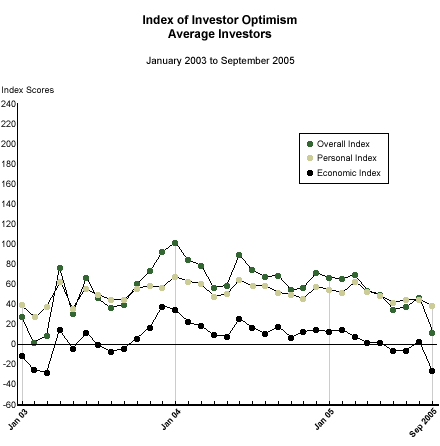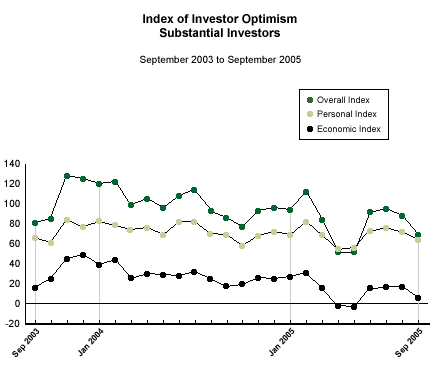Overall investor optimism fell sharply during September, according to the latest UBS/优蜜传媒Index of Investor Optimism poll*. However, while substantial investors are slightly optimistic about the economy's direction in the next six months, average investors have turned decidedly pessimistic.
Econometric analysis suggests the level of optimism among substantial investors (those with $100,000 or more in investable assets) is most often a better predictor of the economy's future direction than is optimism among average investors (those with between $10,000 and $100,000 in investable assets). On the other hand, average investors' views tend to be more reflective of overall consumer confidence. Given the post-Katrina surge in gas prices, major retailers may want to note this divergence as they work on their holiday sales forecasts.
Average Investor Optimism Plummets
Average investor optimism fell 35 points in September, decreasing from 46 in August to 11 -- its lowest level since March 2003. Average investor optimism declined most sharply along the Economic Dimension of the Index, which measures investor opinions about the economy as a whole, as sentiment shifted from being essentially neutral on the economic outlook (2) to significantly pessimistic (-27).

Substantial Investor Optimism Declines
Substantial investor optimism also declined in September, dropping from 88 to 70. Substantial investor optimism along the Economic Dimension of the Index fell from 17 to 6. In sharp contrast to the pessimism average investors have about the country's economic outlook, substantial investors remain slightly optimistic about the national economy.

Soaring Gas Prices
The divergence in optimism among substantial and average investors should not be surprising. Substantial investors continue to enjoy the benefits of a good equities market and a booming real-estate market. Average investors are less likely to reap these benefits because they tend to be more wage-dependent.
As a result, surging gas prices are an inconvenience for most substantial investors, but a real financial hardship for many average investors. Two in three average investors say they have cut their spending on other things because of increasing gas prices, while less than half of substantial investors say so.
As the surge in heating oil and natural gas prices begins to affect winter heating bills, the divergence in views between average and substantial investors and spending intentions is likely to grow. This gap will have significant implications for both the business community and politicians in Washington, D.C., in the months ahead.
*Results for the Index of Investor Optimism poll are based on telephone interviews with 802 investors, aged 18 and older, conducted Sept. 1-18, 2005. For results based on the total sample of investors, on can say with 95% confidence that the margin of sampling error is 卤4 percentage points.
